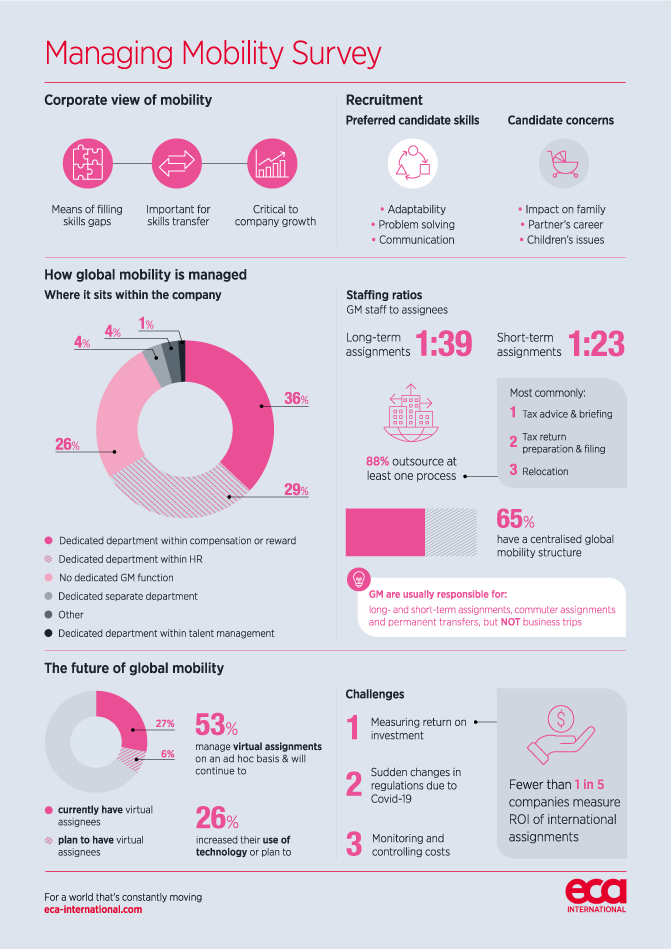An ongoing challenge for those in charge of global mobility (GM) programmes is to enable the success of the international assignments they oversee, while operating within their budgetary restraints. In the past year, many GM teams have seen these restraints tighten as companies across the world have cut costs in response to the widespread economic impact of the Covid-19 pandemic, putting further pressure on ensuring that assignments meet their objectives. Looking at specific areas of how assignments are managed and the structure of the teams tasked with managing them, ECA’s recent Managing Mobility Survey explored how present-day GM professionals are adapting to keep up this balancing act. Some of the survey highlights are outlined below.

Reassuringly, global mobility seems to remain an important pillar of many companies’ wider business strategies. Around three-quarters of survey respondents reported that their senior management view international moves as central to filling local skills gaps, transferring skills and overall company growth. To bring these aims to fruition, well-rounded employees with transferable skills, rather than those with only prior experience and relevant technical competence, are emerging as the preferred candidates for assignments.
Efficiency is key in terms of how global mobility functions are structured. Two-thirds of companies operate a centralised model, co-ordinating all mobility services from one location, which can help maintain a consistent and streamlined approach. Meanwhile, the ratio of GM staff to assignees is greater than in previous years. The survey found that, on average, one GM administrator supports 39 long-term and 23 short-term assignees respectively. These efficiency gains also tend to scale up – companies with more assignees typically reported that they have fewer administrators per assignee.
The pandemic has sparked a rise in virtual assignments, with a third of respondents now using or planning to use this method of assignment. It has also caused GM teams to reassess their use of technology in general – only 10% of companies are satisfied with their current use of GM-related technology solutions and a quarter have increased or will increase their technology usage. Perhaps most encouragingly, GM teams are adopting more of a strategic role within many companies and the work of GM teams in response to the pandemic seems to have advanced this process.
Sudden changes in regulations brought on by the pandemic registered as one of the major difficulties currently facing global mobility, particularly with the industry heavily exposed to the now-volatile situation surrounding international travel. Family concerns, which remain the primary obstacle to mobility from the assignee’s perspective, have also been exacerbated. However, measuring return on investment was rated as the most significant challenge, reflected in the fact that the vast majority of companies do not undertake this practice for their international assignments. In a testing business environment, understanding exactly how and where their mobility programmes are performing or underperforming relative to objectives could prove vital to GM teams that need to ensure their limited resources are being used as effectively as possible.
FIND OUT MORE
The Managing Mobility Survey provides insights into how companies are adapting their approach to global mobility management to ensure continued success. Free to survey participants, reports can also be purchased either individually or as a full set.
Create an account with ECA to receive access to content and insight and you can also sign up to our newsletter.
Please contact us to speak to a member of our team directly.